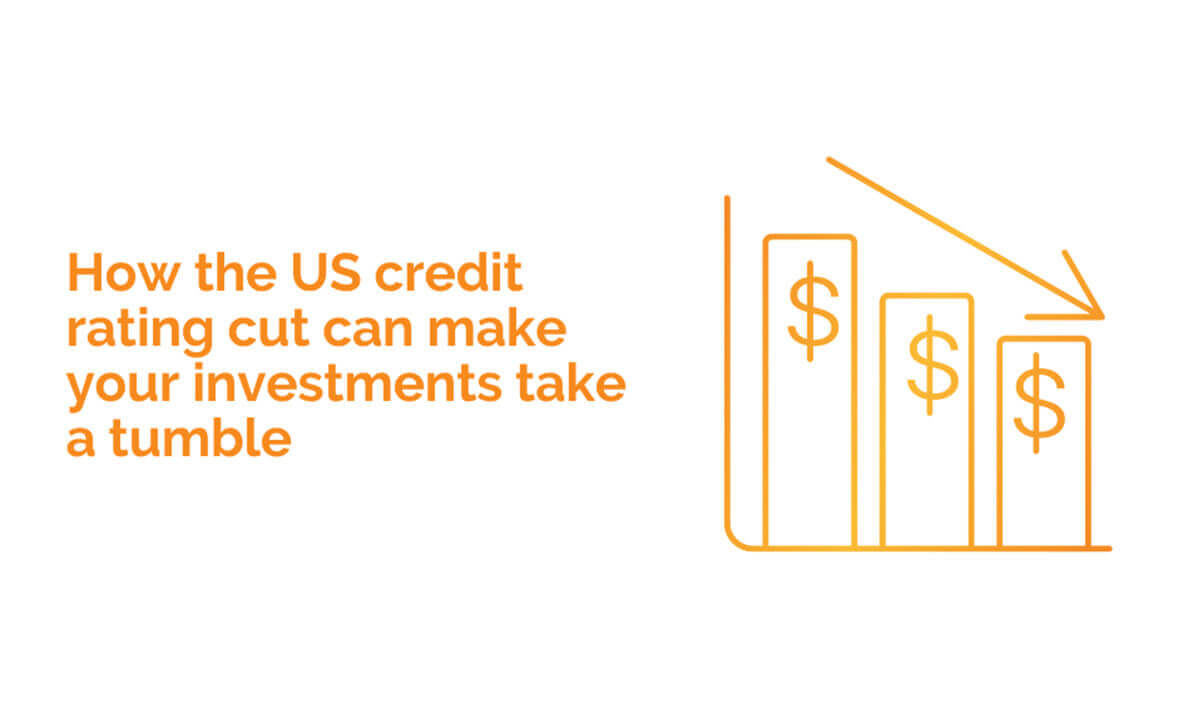How the US credit rating cut can make your investments take a tumble
Americans take pride in being No. 1, so Fitch's downgrade of the United States of America's credit rating has certainly rattled the nation's pride and sent ripples through the global financial system.
On August 1, the United States was stripped of its top-tier sovereign credit rating by Fitch Ratings to AA+ from AAA.
Two of three major rating agencies have now placed their US sovereign rating at a less than pristine level...
The US is no ordinary player in the financial world and may not get immediately impacted. But the rating can cause collateral damage due to regulatory issues.
What Sparked the Downgrade?
Fitch cited an expected fiscal deterioration over the next three years, and growing government debt burden, and the erosion of governance that has manifested in repeated debt limit standoffs and last-minute resolutions.
What happens next?
Unlike typical downgrades that signal higher risk, a downgrade of the US doesn't necessarily mean higher borrowing costs.
US Treasury securities remain a sure bet, and ironically, a downgrade may push interest rates down.
Dangers Ahead
While a single downgrade may not damage the country’s creditworthiness in the short term, failing to reach an agreement on the debt ceiling could lead to worse consequences.
If the United States fails to make payments, Treasury yields, mortgage rates, and other interest rates may rise.
What is the Debt Ceiling?
A US law dating to 1917 fixed the aggregate dollar limit that the United States can borrow cumulatively by issuing bonds. This is called the debt ceiling.
The current debt ceiling is $31.4 trillion.
If the debt ceiling negotiations in Congress are not resolved before the deadline, the US Treasury may be forced to default. If the debt ceiling negotiations in Congress are not resolved before the deadline, the US Treasury may be forced to default.
By hitting the limit and failing to pay interest payments to bondholders, the United States would be in default.
Rating a Notch Lower, But Still Strong
AA+ means a step down from the highest credit quality, but it still indicates a very strong capacity to meet financial commitments. According to Fitch, AA ratings denote “expectations of very low default risk,” a step down from AAA borrowers, who are viewed as having the lowest default risk.
Rating Cut Impact
The Fitch downgrade should have minimal negative impact on the allure of US Treasuries.
High inflation and growth remain the key triggers for bond demand.
Fitch’s rating downgrade should be largely mitigated by the substantial stock of US private wealth, with correspondingly high safe haven demand for US Treasuries.
However, this does not mean there will be no negative impact on US debt.
Fitch's downgrade could lead to further downgrades of US corporate credit.
This raises the possibility that certain corporate bonds will lose their Investment Grade rating, prompting funds with an Investment Grade-only mandate to sell.
Global Impact
As many assets are benchmarked to US Treasuries, market turbulence from a more severe downgrade would be felt globally.
Bonds of many companies like Microsoft and Johnson & Johnson could be downgraded.
Certain regulations require financial institutions to hold AAA rated securities. The downgrade may lead to portfolio adjustments.
Currency Dynamics
The US dollar, being the world's reserve currency, could experience short-term fluctuations.
However, the process of de-dollarisation could get some momentum, with more countries looking to derisk the impact of a likely weakening of the dollar.
Equities and fixed-income in emerging markets like India could see a sell-off as foreign portfolio investors turn to safe haven buying.
While the downgrade will have little impact on US Treasuries, which underpin the financial system as a global safe asset, it has injected some uncertainty into financial markets.
A Jolt, But Not a Crisis
Fitch's downgrade of the US sovereign credit rating is significant, but it doesn't spell disaster.
The unique nature of US Treasuries and the financial system's resilience may counteract the usual effects of a downgrade. However, the situation warrants careful observation, as further missteps could have broader consequences.
The more the US flirts with the debt ceiling, the more investors must consider it a risk, possibly impacting US interest rates even after this episode passes.
In the grand scheme, it's a jolt but not a crisis. Or, let us hope so.

